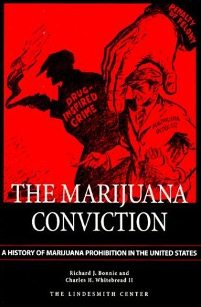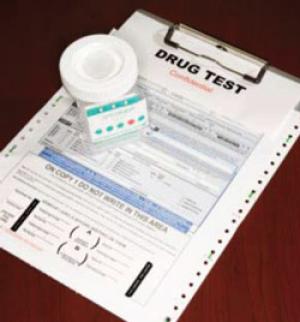A bill pending in California would make misdemeanors out of drug possession offenses that are currently felonies. An impressive coalition is growing in support of it, but law enforcement is skeptical.
The fight-back to restore federal needle exchange funding stripped out of last year's budget has begun in earnest, with a congressional call-in, actions in a dozen cities, and civil disobedience and dozens of arrests on Capitol Hill.
We continue our newest offer for donating members, the drug policy classic reprint: "The Marijuana Conviction: A History of Marijuana Prohibition in the United States." This is one is available for donations of just $22 or more.
Andres Manuel Lopez Obrador, presidential pre-candidate for Mexico's left-leaning Democratic Revolutionary Party, says he will end the drug war if elected. Meanwhile, the rightist PAN's nominee takes a drug test.
Delegates to the UN's Commission on Narcotic Drugs have voted unanimously to endorse overdose prevention measures, including the use of the overdose reversal drug naloxone.
With the Greek health system shaken by the economic crisis, new HIV cases are spiking, and the government is preparing harm reduction measures, including handing out needles and condoms, to halt the rise.
Florida Gov. Rick Scott (R) has quietly signed into law a controversial bill that mandates drug testing for state employees. Florida becomes the first state in the nation to do so.
The DEA went a step too far when it tried to shut down a pair of Florida CVS pharmacies, a federal appeals court has ruled. The ruling is only temporary, though, so stay tuned.
From California to the nation's capital, medical marijuana keeps making news. Here's the good, the bad, and the ugly.
A Sanger, California, man is dead after being shot by police as he first pulled a weapons, then tried to flee in an undercover drug bust gone bad.
Here's a hint for deputies: Don't go to buy heroin in uniform while the joint is under surveillance in a drug investigation. There are more lessons to be learned this week, too.
Events and quotes of note from this week's drug policy events of years past.
At the end of February, state Sen. Mark Leno (D-San Francisco) introduced a bill that would make drug possession for personal use a misdemeanor in California. If the bill passes, California would join 13 other states and the District of Columbia that have taken the cost-saving and rehabilitation-aiding step of not making felons out of mere drug users.

California needs to reduce prison and jail overcrowding (US Supreme Court)
The measure,
Senate Bill 1506, would make the possession of any controlled substance -- except up to an ounce of marijuana, which is already decriminalized -- a misdemeanor punishable by up to a year in county jail. Under current law, possession of controlled substances, such as heroin, cocaine, or methamphetamine, is a felony punishable by either up to 16 months in county jail or two to three years in state prison.
A felony conviction doesn't just mean jail or prison time. It becomes a permanent barrier to reentry into society, making access to education, employment, and housing more difficult, as well as barring people with such convictions from obtaining professional licenses and subjecting them to various other obstacles.
The bill is backed by an array of drug policy, civil liberties, and human rights groups, including early supporters the
American Civil Liberties Union, the
California State NAACP, the
Drug Policy Alliance, and the
Ella Baker Center for Human Rights.
Budget-conscious California voters have shown an interest in drug sentencing reform in the past. In 2000, they passed Proposition 36 to divert drug offenders from prison to treatment by a margin of 61%. Since then, the state's economic situation has only gotten worse, and pressure to do something about its gargantuan $9.3 billion corrections budget is on the rise.
A
Lake Research Partners poll released last April found that 72% of respondents favored changing drug possession from a felony to a misdemeanor, with 40% saying small-time drug possession for person use should be considered an infraction, with no jail time. Strong support for such a reform cuts across party lines, with support among Democrats at 79%, among independents at 72%, and among Republicans at 66%.
"Over the years we have learned that long prison sentences do little to deter or limit personal drug use," said Sen. Leno. "In fact, time behind bars and felony records often have horrible consequences for people trying to overcome addiction because they are unlikely to receive drug treatment in prison and have few job prospects and educational opportunities when they leave. This legislation will help implement public safety realignment and protect our communities by reserving prison and jail space for more serious offenders," he said.
"This bill merely revises the charge from a felony to a misdemeanor," Leno told the Chronicle Tuesday. "It will save the counties about $160 million a year, according to the Legislative Analyst's Office, and the state another $65 million. Thirteen states have already done this, and they have higher rates of treatment and lower rates of drug use and property and violent crime."
"The war on drugs has been an abysmal failure we can no longer afford," said Allen Hopper, Criminal Justice and Drug Policy Director at the ACLU of California. "California voters agree the punishment should fit the crime, and a felony for simple possession is ridiculous. Those who are addicted to drugs need treatment, not a jail cell and a felony conviction with severe and life-long consequences, like reduced access to job opportunities, student loans, and small business loans."
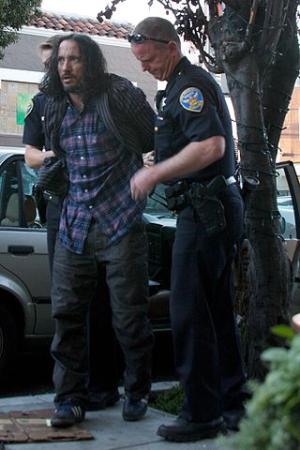
Drug possession would be a misdemeanor in California rather than a felony if SB 1506 passes (wikimedia.org)
"The goal is to make the penalty closer to what people think it should be," said Margaret
Dooley-Sammuli, senior policy analyst for criminal justice and drug policy at the ACLU of San Diego and Imperial Counties. "People think a felony charge is too harsh, and there is pretty universal support for treating drug use more as a health issue and prioritizing law enforcement resources for people convicted of serious offenses," she told the Chronicle.
The push for the bill is picking up steam,
Dooley-Sammuli said.
"We have quite a broad coalition, and the list of groups coming out in support is long and getting longer by the day," she said. "We have faith, treatment, and housing groups; we have job placement organizations; we have family members and other folks who realize the this penalty is just too harsh. We've just added two more:
California Attorneys for Criminal Justice, a defense attorneys' group, and the
William Velasquez Institute, a group that will bring Latino communities into the process of helping to shape policies that impact them."
While an impressive coalition is budding to support the bill, and while polls suggest strong public support for such a measure, not everybody is on board, particularly law enforcement.
"We're opposed to this bill for a variety of reasons," said John Lovell, a Sacramento attorney who is a lobbyist for the
California Police Chiefs Association. "We don't think it's appropriate to reduce these offenses to misdemeanors because of severe unintended consequences. No one in California is being incarcerated for a first or second drug possession offense; instead, they are sent to a Proposition 36 drug treatment program," Lovell told the Chronicle.
"We believe this will create a disincentive for people to participate in a Prop 36 treatment program, and that is not a good thing," the lobbyist continued. "To the extent we can have a successful treatment result, that is one less person in a cycle of drug addiction."
"Oh, please!" exclaimed
Dooley-Sammuli. "Lovell said the same kinds of things when Prop 36 passed. They were saying the sky would fall, that nobody would be in treatment and there would be crime in the streets, but the crime rate continues to go down."
Given the current fiscal constraints on the state criminal justice system, the "real world" result of downgrading drug possession to a misdemeanor would be that drug offenders essentially walk free, Lovell said.
"Say a person is convicted of meth possession," he said. "He is told he has a choice of Prop 36 treatment or going to the county jail, but the jails are all filled to capacity, and nobody does any time for a misdemeanor offense. An attorney representing such as person is ethically bound to say 'If you refuse treatment, there is no real sanction at all,'" Lovell maintained. "These will be misdemeanants, not felons, not under supervision and not breaking the cycle of addiction, which means the crimes they commit to purchase their dope will continue," he said. "It's not like you get a scholarship to pay for the cost of your meth."
But the bill provides for up to three years probation -- five years in some cases -- and would allow judges to order drug treatment as a condition for probation.
Saying that the state will benefit from saving money on not prosecuting drug users as felons is "a hackneyed argument," Lovell said. "If you say it will save money because these people aren't being supervised, yes, it will save that money, but if they're not being supervised they're more likely to go out and commit the economic crimes addicts commit. It's not so much a savings as a cost shift," he argued.
"We do not see this bill as yielding any positive public policy results," Lovell summed up.
"None of California's existing programs to make treatment available will be affected by this," countered Dooley-Sammuli, "and counties will have the freedom to use these dollars more wisely to make treatment more available. Compared to five years ago, treatment dollars have absolutely been gutted, and we're really working to identify ways to preserve funding so we can protect treatment. It's really disingenuous for our opponents to talk about this getting in the way of access to treatment. If Jerry Lovell is worried about access to treatment, we call on him to support this bill."
Leno responded more tersely to Lovell's arguments. "He's a dogmatic extremist. If you think drug use is a bad thing, the states that have actually lowered drug use are not felony states," the San Francisco Democrat said. "By making these offenses misdemeanors, we can remove barriers to housing, education, and employment -- the very things a felony conviction makes it more difficult to obtain, those unintended consequences of a felony conviction."
Now, it's up to the measure's supporters to get it moving. The bill will be heard in the Senate Public Safety Committee next month. For it to pass this year, it has to get out of committee, win approval in the Senate, and then go through the same process in the Assembly. And it has to happen by August, when the session ends.
"It's a very tight time-frame," said Dooley-Sammuli. "We're still educating people about this bill, but this is a serious effort, and we believe we can get that support with the right coalition partners and more education. Sen. Leno doesn't introduce bills just to make a statement, but because he thinks they have a political chance."
"We're looking for support anywhere and everywhere," Leno said. "We are talking to law enforcement agencies to educate them that there is no data showing that felony convictions reduce drug use."
There's clearly some work to be done on that score. But more important is getting actual legislators to vote for the bill.
"I believe there will be significant, and hopefully sufficient, Democratic support for the bill," said Leno, "and I'm also hoping Republican colleagues will see we can't waste the money and must invest in evidence-based programming."
California has the chance to pass a smart, cost-effective, and humane drug sentencing reform bill, but the clock is ticking.
The other states that treat drug possession as a misdemeanor are Delaware, Iowa, Maine, Massachusetts, Mississippi, New York, Pennsylvania, South Carolina, Tennessee, West Virginia, Wisconsin, and Wyoming, as well as the District of Columbia.
back to top
After 20 years of walking in the political wilderness, public health and harm reduction advocates for federal funding for needle exchange programs made it to the Promised Land in December 2009, when the Democratic-controlled Congress overturned the longstanding funding ban. But just two years later, led by the Republican-controlled House and with the acquiescence of the Democratic-controlled Senate, Congress reinstated the ban in its 2012 federal omnibus spending bill.
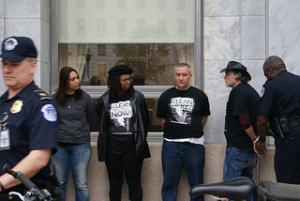
Needle exchange advocates arrested on Capitol Hill Wednesday (Stephanie Simpson, Housing Works)
Advocates were outraged and dismayed by the congressional action, but are determined to fight back to restore funding for a harm reduction practice repeatedly proven to save lives and reduce the spread of infectious blood-borne diseases, such as HIV/AIDS and hepatitis C. This week, they came out swinging with a national day of action Wednesday that saw organized call-ins to members of Congress and civil disobedience actions leading to dozens of arrests at the offices of four of them, as well as actions in a dozen others cities across the county.
Although the funding ban's main proponents are Republicans, repealing the ban is actually the states' rights, deregulation position. Each year the federal government authorizes funding for grants to states to be used for AIDS prevention and treatment. When the ban was temporarily lifted, it neither increased nor decreased the amount of AIDS funding, but it meant that states could choose for themselves whether or not to use some of those funds to support needle exchange programs.
The activists have science and the evidence on their side. The Centers for Disease Control and Prevention (CDC), American Medical Association, National Academy of Sciences, American Public Health Association, and numerous other scientific bodies have found that
syringe exchange programs are highly effective at preventing the spread of HIV/AIDS and other infectious diseases. Eight federal reports have found that increasing access to sterile syringes saves lives without increasing drug use.
More than 200 needle exchange programs operate across the country in cooperation with local law enforcement officials and health departments, but many are in danger of closing their doors or cutting back services without access to federal funds. That puts lives and the public health at risk.
Needle exchange supporters said the restored the ban will result in thousands of Americans contracting HIV/AIDS, hepatitis C or other infectious diseases next year alone.
According to the Harm Reduction Coalition (
HRC), needle sharing by injection drug users accounts for 8,000 new cases of HIV and 15,000 new cases of hepatitis C each year. In New York City, there has been a 75% reduction in new HIV cases as a result of instituting such programs, according to a 2005 study cited by
HRC.
"We need Congress to stand behind public health and science, and declare a cease-fire on syringe exchange," said
HRC executive director Allan Clear. "All of the research tells the same story: Syringe exchange prevents infections, promotes drug treatment, and reduces drug use. Congress must stop treating syringe exchange as an ideological pawn in partisan politics."
"The federal syringe funding ban was costly in both human and fiscal terms -- it is outrageous that Congress has restored it given how overwhelming and clear the science is in support of making sterile syringes widely available," said Bill Piper, director of national affairs for the
Drug Policy Alliance. "Make no mistake about it -- members of Congress who supported this ban have put the lives of their constituents in jeopardy."
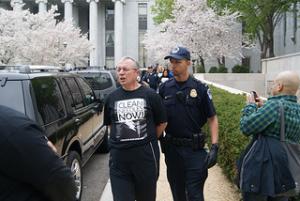
Cherry blossoms bloom in DC as arrestee is detained (Stephanie Simpson, Housing Works)
The renewed ban on federal funding for needle exchanges couldn't come at a more inopportune time. With a wave of drug users who began their careers with
opioid pain pills finding succor in the needle, making access to clean needles more difficult is likely to make matters worse.
"We need to support syringe exchange programs now more than ever," said
HRC policy director Daniel Raymond. "Health officials in many states report a disturbing new trend of hepatitis C outbreaks in young people, driven by a new wave of injection drug use linked to the prescription painkiller epidemic. We're in danger of starving programs of federal funds, just when the demand for syringe exchange is increasing."
In Washington, while a coordinated campaign of phone calling kept the congressional switchboard humming, dozens of AIDS and harm reduction activists went to Capitol Hill and held sit-ins at the offices of four House Republicans, including Speaker John Boehner (R-OH), Rep. Denny
Rehberg (R-MT), Mike Rogers (R-MI) and Eric Cantor (R-VA) for their role in reinstating the ban on federal funding for syringe exchange programs last December.
Carrying signs reading "Syringe Exchange: A Fix for AIDS," the activists chanted and blocked doorways before being arrested by Capitol Police. They were expected to be booked and released later Wednesday.
At least 32 people were arrested at Congress, according to
Housing Works, a New York City-based group that provides services for AIDS sufferers. Housing Works participated in the action as part of the
We Can End AIDS Coalition, an umbrella group coordinating a July 24 mass protest in Washington around economic justice and human rights for AIDS patients.
"Our government should be embarrassed as this year's host of the International AIDS Conference to have sneaked this into an unrelated bill under the cloak of night last December," said Housing Works CEO Charles King. "The US cannot be any shining example to the rest of the world on how to end the AIDS epidemic when we’re still fighting foolish policies that reject what we know works."
Wednesday's action was only an opening skirmish in what will be a determined battle to restore the federal funds. The AIDS, public health, and harm reduction communities are not going to just roll over and play dead while Congress makes decisions that will result in real people becoming really dead.
"We refuse to let the close-mindedness of anti-science conservatives dictate public health policy," said Clear. "We can't afford these political games, and we can't afford any more new infections. Our communities are struggling; Congress needs to listen and show leadership by rescinding the funding ban."
back to top
We continue our newest offer for donating members, the reprinted drug policy classic
The Marijuana Conviction: A History of Marijuana Prohibition in the United States. Originally published in 1974, this amazing work by professors Richard Bonnie and Charles
Whitebread was the first comprehensive history of marijuana use and its prohibition in the United States. Bonnie and
Whitebread's historical overview examines the origins and history of marijuana prohibition as well as the laws' unintended consequences.
Thanks to a generous donation from our friends at the
Drug Policy Alliance, we are able to offer this 368-page volume, which retails at $32.49,
for $22 including shipping. (Add $2 for Canada or Mexico or $8 for overseas.)
Donate $22 or more to StoptheDrugWar.org and you will be eligible to receive a complimentary of The Marijuana Conviction. Click here to make a donation online by credit card or PayPal. You can also donate by mail -- info below.
As a reader of Drug War Chronicle you know that it is a challenging time in drug policy reform. Medical marijuana is under attack;
draconian sentencing bills are getting heard in Congress; drug testing bills are spreading from state to state. To help us fight back as hard and as well as we can, I hope you'll consider donating more than $22 if you can afford it, or to supplement your $22 with a continuing monthly donation. If gift items like
The Marijuana Conviction are not important to you, I hope you'll consider sending a donation that's entirely for our work. (We are grateful for donations of any size -- don't feel bad if $22 is what you have to spare and you want the book!)
Donations to StoptheDrugWar.org can be made online at
http://stopthedrugwar.org/donate, or they can be mailed to:
DRCNet Foundation (tax-deductible), P.O. Box 18402, Washington, DC 20036; or Drug Reform Coordination Network (non-deductible for lobbying), same address. (Contact us for information if you wish to make a donation of stock.) Be sure to indicate if you are requesting
The Marijuana Conviction or another of our current gift items.
Thank you for standing with us to stop the drug war's cruelties and meet the opportunity this time offers to make a brighter future. And don't get discouraged by the challenges our movement and the cause are currently facing:
Time, and the truth, are on our side!
Sincerely,
David Borden, Executive Director
StoptheDrugWar.org
Washington, DC
http://stopthedrugwar.org
back to top
Andres Manuel Lopez Obrador (AMLO), the candidate-in-waiting of the center-left Democratic Revolution Party (PRD), said last week that he would end the US-backed war on drugs in Mexico if he is elected president. He said his government would instead concentrate on creating jobs and fighting corruption.
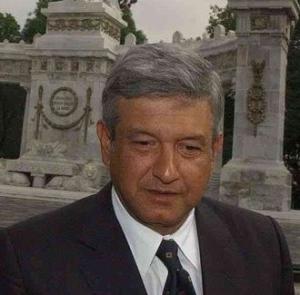
Andres Manuel Lopez Obrador (wikimedia.org)
His comments come as the region is awash in criticism of US-style drug wars and calls for a discussion of alternatives, including decriminalization and legalization. Regional heads of state will meet to discuss the issue later this month, and it looks likely to be on the agenda at the Summit of the Americas in Colombia next month.
AMLO was also the
PRD candidate in the 2006 elections, barely losing to National Action Party (PAN) candidate Felipe Calderon in a hotly contested election. At least in part to strengthen his stature amid accusations of election fraud, Calderon called out the military to fight Mexican drug trafficking organization shortly after taking office. Since then, more than 50,000 people have been killed in prohibition-related violence, shaking the country's confidence in its institutions.
Lopez is currently trailing the Institutional Revolutionary Party's (PRI) candidate Enrique Pena
Nieto and PAN nominee Josefina Vazquez
Mota in
national polls. In one poll early this month, Pena
Nieto had 36%, Vazquez
Mota had 29%, and
AMLO had 17%. In another, the figures were Pena
Nieto at 49%, Vazquez
Mota at 28%, and
AMLO at 19%.
"We're going to stop the war (against organized crime) and justice will be procured," if he is elected,
AMLO said in remarks reported by the Mexico City daily
La Jornada. "We are not going to use this strategy because it has not produced results. There will be jobs, we'll fight corruption and calm down the country. We know how to do it, I'm sure," he said.
He also vowed to end impunity and criticized the government's use of high-profile arrests and heavily-covered presentations of captured
capos to the media as evidence it was actually achieving anything in its battle with the drug cartels.
"Politicians who want to resolve everything through the use of the media are responsible for the lack of security and violence, because they have not established justice, employment and wellbeing. They look the other way and, continue a policy that produces poverty, resentment, hate, hostility, insecurity and violence; they want to resolve it with wars, threats of a crackdown and PR stunts," he said.
"How are those who have no moral authority, who are dishonest and corrupt, going to guarantee justice?"
AMLO asked. "With what moral authority can they ask others to do right if they don't do it themselves? And furthermore they let established interest groups make decisions just like in the past in this country."
Bernardo
Batiz, whom Lopez
Obrador has named as his attorney general-in-waiting if he wins, added that they want to bring social peace and respect for the human rights of victims, witnesses, and criminals alike.
"We propose to move from a war where there are enemies to a justice system with humane criteria," he said. He also vowed there would not be harsher laws, more prisons, more soldiers in the streets, or "complicity with anybody," a clear reference to the widespread suspicion in Mexico that the Calderon government is cozy with Joaquin "El
Chapo" Guzman and his
Sinaloa cartel.
While
AMLO and company were campaigning against the drug war, PAN candidate Vazquez
Mota was doing some drug-related politicking herself. On Saturday, as she filed documents needed to make her the official PAN candidate,
Vazquez Mota also handed in a drug test and a lie detector test she said showed she has no ties to organized crime.
The election is July 1.
back to top
Delegates to the 55th session of the UN Commission on Narcotics Drugs (CND) in Vienna unanimously approved a resolution to promote measures to prevent drug overdose deaths last Friday. The resolution calls on the UN Office on Drugs and Crime (UNODC), the World Health Organization (WHO), and other international organizations to work with individual countries to address and reduce drug overdoses. Crucially, the resolution included mention of naloxone, an opioid antagonist that can effectively reverse opiate overdoses and which does not carry any danger of abuse.
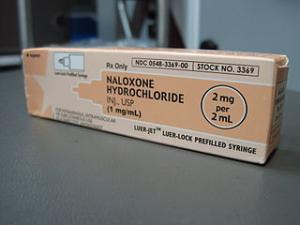
Naloxone can save lives, the CND recognized Friday (wikimedia.org)
The resolution was introduced by the Czech Republic and cosponsored by Israel and Denmark (the latter on behalf of the European Union). Earlier in the week, Gil
Kerlikowske, head of the US
Office on National Drug Control Policy (
ONDCP -- the drug czar's office) affirmed US support for overdose prevention. In his opening statement at the week-long session,
Kerlikowske endorsed training public health and medical personnel in overdose recognition and response, as well as the use of
naloxone and other overdose reversal medications.
"Every life is worth saving," said
Dasha Ocheret, policy and advocacy program manager for the
Eurasian Harm Reduction Network. "Everyone knows someone who has died from an overdose. It's thrilling that the United Nations recognizes this is a problem to be taken seriously and something can be done."
"This represents a critical step towards improving global public health," said Donald McPherson, director of the
Canadian Drug Policy Coalition and former drug policy coordinator for the city of Vancouver. "The global overdose epidemic can be addressed with meaningful, evidence-based interventions to reduce the immediate potential harms associated with
opioid use, and prevent unnecessary death. It is heartening to witness
CND member countries take this step together to save lives."
The biggest risk of fatal overdose is around opiates and
opioid pain medications. According to the
UNODC, "the ingestion of
opioids accounts for nearly half of the global drug-related deaths, and the majority of deaths could have been prevented." The
UNODC puts the number of user of opium derivatives, both medical and non-medical, at around 21 million worldwide.
Opioid overdose deaths are generally preventable for three reasons: The deaths occur gradually after drug use, there are typically other people present, and the effects of overdose can be reversed with
naloxone, also known under its brand name,
Narcan.
In some countries, including some states in the US, there are ongoing programs to offer
naloxone to drug users, their friends, and family members. Last fall,
Massachusetts announced its 1,000th overdose reversal using naloxone. New Mexico has also been a pioneer in expanding the use of
naloxone.
"
Naloxone is a safe and effective medication that has been available for more than forty years," said Sharon
Stancliff of the New York City-based
Harm Reduction Coalition. "It's exciting that the UN has officially recognized the importance of making this life-saving medication more widely available. It is vital that it is made accessible to people who need it, both inside the hospital setting and outside, through emergency services and to family members of
opioid users."
back to top
The Greek government announced Tuesday that it will begin harm reduction measures, including handing out condoms and needles to heroin addicts, in an effort to slow an alarming rise in new HIV cases, Agence-France Presse reported. The government anti-drug organization Okana and volunteer organizations will hand out 30,000 condoms and 10,000 needles as part of the effort, which will be initially launched in Athens.

view of the Acropolis at sunset (wikimedia.org)
"There is an imperative need for immediate action to limit the spread of infection," deputy health minister
Michalis Timosidis said in a parliamentary document.
Greek health officials had reported in November that new HIV cases were up by 52.7% last year over 2010. The government center for disease control and prevention said over 800 new cases had been recorded through October 2011.
A third of the new cases were reported among gay men, but officials said most new cases were linked to prostitution and intravenous drug use. The number of new HIV infections among heroin users increased a whopping 1,250% in a year, the disease control center said.
Because of the economic crisis, Greece has been forced to radically cut social spending to eliminate budget deficits in order to receive loans from the International Monetary Fund and the European Union. Those spending cuts have seen staff layoffs and mergers in the health sector, which doctors said are weakening the effectiveness of the Greek health care system.
back to top
Florida Gov. Rick Scott (R) has quietly signed a bill that would require state employees to undergo random, suspicionless drug testing. His office announced after normal business hours Monday that the deed had been done.
Florida becomes the first state in the nation to pass such a bill, although other states may follow.
The measure,
House Bill 1205, authorizes state agencies to require that employees submit to random, periodic,
suspicionless drug testing. Under the bill, 10% of an agency's work force would be tested every three months. The bill strips out provisions in Florida law limiting drug testing to safety-sensitive positions and makes it easier to fire a worker after a first confirmed positive drug test.
Scott had first tried to impose drug testing on state workers via an executive order, but suspended it after it was challenged in the courts. A strong proponent of drug testing, Scott also supported and signed into law a bill last year to require welfare applicants and recipients to undergo drug testing. That law has also met legal challenges and is currently blocked by a federal district court judge's temporary injunction.
This law, too, is certain to face legal challenges, labor leaders and civil libertarians told the
Associated Press after it passed the state legislature earlier this month. The federal courts consider drug testing a search and thus subject to Fourth Amendment proscriptions against warrantless searches. They have carved out only limited exceptions to the general rule -- for safety-sensitive positions, for some police doing drug law enforcement, for some high school students -- and have ruled against earlier efforts to drug test elected officials and welfare recipients.
"This is just another attempt to vilify state workers and make them the problem," said Florida AFL-CIO legislative director Rich
Templin. The union represents about 100,000 state employers and has warned this will likely mean more lawsuits for the state.
"State workers don't trade their constitutional rights for a state paycheck or other benefits," said Howard Simon, executive director of the ACLU of Florida, which is already part of the challenge to the welfare drug testing law. "Unfortunately, the governor and legislature appear to want to re-learn that lesson over and over again."
back to top
In its effort to prevent the diversion of prescription pain medications into the illicit market, the DEA moved last month to bar two Florida CVS drug stores from selling the drugs. But last Wednesday, the US Court of Appeals for the District of Columbia ruled the agency had gone too far and temporary blocked the DEA's order.
The case is Holiday CVS LLC v. Eric Holder, No. 12-5072.
The DEA had argued that the two CVS pharmacies in Sanford, Florida, were inappropriately filling prescriptions for
oxycodone, an
opioid pain reliever that is widely used. The DEA also said there were "suspicious" sales of other controlled substances.
But CVS argued that the DEA's enforcement actions were "arbitrary and capricious," that it had already taken steps to address DEA concerns, and that it would suffer "irreparable harm" if not allowed to fill prescriptions for controlled substances at its pharmacies.
A federal district court judge had initially blocked the DEA order, but allowed it to take effect on last Tuesday. CVS immediately appealed the decision.
This is the second prescription medicine provider the DEA has gone after in this manner in Florida. Earlier, the agency issued an order to Cardinal Health Inc. to prevent it from selling prescription drugs from its warehouse facility in Lakeland, Florida. Cardinal Health's client pharmacies include the two Sanford CVS stores. Cardinal Health had already won a similar stay, but last Friday,
the same DC appeals court upheld the DEA order.
The DEA has identified Florida as an epicenter of an "epidemic" of
non-presciption use of
opioid pain relievers and has moved aggressively against doctors it accused of operating "pill mills" in the state. Florida is the home of more than 500 pain clinics, down from more than 700 last year after the state tightened regulations on them this year.
DEA and CVS must file responses to the appeals court order next week. In the meantime, CVS can still fill prescriptions and its customers can still pick them up.
back to top
From California to the nation's capital, medical marijuana keeps making news. Here's the good, the bad, and the ugly:
Arizona
Data from the Department of Health Services show that
more than 22,200 Arizonans have received permission to use medical marijuana. People aged 31-50 make up 40% of medical marijuana users, those aged 51-81 account for 35%, and those aged 18-39 account for 25%. Nearly three-quarters are men, and the overwhelming majority of patients reported chronic pain as their medical condition, while muscle spasms were also high on the list, health officials reported. Other ailments include hepatitis C, cancer and seizures.
California
Last Wednesday,
the city of Redding failed in its effort to force local dispensaries to close. A Shasta County Superior Court judge denied the city's request for a preliminary injunction that would have compelled their closure, saying that the city can't ban dispensaries simply by declaring them a nuisance. The judge relied heavily on a
4th District Court of Appeal decision in which the court struck down the city of Lake Forest's effort to ban dispensaries. That left
Redding leaders scratching their heads the next day.
Also last Wednesday,
the city of Oakland approved four new potential dispensaries. Only one of the four already has an approved location.The other three will be given four months to find a new location that satisfies city rules requiring dispensaries be located at least 600 feet from schools, parks and youth-serving programs. The city also approved one alternate dispensary group. Whether any of them actually open for business remains to be seen, given the ongoing federal crackdown in the state.
Also last Wednesday, the
San Jose Cannabis Buyer's Collective announced that its challenge against its closure by the city of San Jose was revived by the Sixth District Court of Appeal, which ruled that a Santa Clara Superior Court judge erred in denying their petition for writ of mandate on the ground they failed to exhaust administrative remedies.
Last Thursday, the
Berkeley Patients Group announced it would move from its current location but relocate elsewhere in Berkeley. The announcement came amid rumors the venerable and well-loved dispensary would close its doors after its landlord received a threat letter from the office of US Attorney for Northern California Melinda Haag.
Last Thursday,
DEA agents raided a dispensary in Murrieta in Riverside County. They were accompanied by Murrieta Police as they hit the Greenhouse Cannabis Club and seized three pounds of marijuana, various edibles, and 18 clones. Two volunteers who were present during the raid said at least a dozen federal agents and local police officers stormed into the nondescript Jefferson Avenue storefront with their rifles drawn. According to the 36-page affidavit filed with the court in support of the search warrants, an undercover federal agent in February was able to purchase a gram of medical marijuana for $20 at the club after presenting a medical marijuana card. Agents also received statements from card-holding patients that they had purchased medical marijuana at the club.
Also last Thursday,
US Attorney for Northern California Melinda Haag did a wide-ranging interview with KQED. Among other things, she signaled a continuing crackdown on dispensaries near schools, playgrounds, or other places where children assemble.
On Tuesday,
the city of San Francisco proposed banning hashish, edibles, and tinctures from city dispensaries. In a memo to dispensaries titled "Medical Cannabis Edibles Advisory," the Department of Public Health recommended that dispensaries "do not produce or dispense syrups, capsules, or other extracts that either required [sic] concentrating cannabis active ingredients or that requires a chemical production process." The city says it isn't a ban because there is no provision for enforcement, but dispensaries that want to play by the rules will have to abide. But on Wednesday,
the city announced it had reversed its decision.
Also on Tuesday, word leaked out that
San Francisco DA George Gascon's office has issued a memo saying all medical marijuana sales in the city are illegal. That would be a shocking policy change from
Gascon's predecessors, Terence
Hallinan and
Kamala Harris, if it actually is a policy change. But there is some uncertainty about whether this marks a real shift or merely the use of boilerplate language by underlings. Stay tuned.
Also on Tuesday,
a new medical marijuana initiative was approved for signature-gathering. Secretary of State Sandra Bowen's office announced that the Medical Marijuana Patient Associations initiative had been approved. It would allow patients to form associations to cultivate, process, and distribute medical marijuana and ensure that "neither the state nor any local government may prohibit operation of a medical marijuana patient association, including a storefront, unless a court finds it is an actual nuisance." Proponents have until August 16 to gather 504,000 valid voter signatures.
Colorado
Last Thursday, Denver's 9 News reported that
US Attorney John Walsh plans to demand that more dispensaries shut down because they are operating within 1,000 feet of a school. A spokesman declined to say how many more threat letters will go out, but said they will be sent "soon." An earlier round of threat letters to dispensaries and their landlords resulted in 22 closing their doors or relocating. The 1,000-foot rule is based on a federal criminal sentencing enhancement, not the state's medical marijuana law.
On Tuesday,
an attorney for six Fort Collins dispensaries forced to close after a voter-approved ban said their lawsuit against the city is likely to be withdrawn. Attorney Brett Barney said the case is "on hold" and that dispensary owners may not want to throw good money after bad. "I advised my clients we were not going to get justice from this court," Barney said. A district court judge had earlier denied a temporary restraining, ruling that the dispensaries had not demonstrated their constitutional rights were violated or that they would suffer irreparable harm.
Also on Tuesday, US Attorney John Walsh sent a
letter to Boulder County District Attorney Stan Garnett responding to
Garnett's letter last week highly critical of federal interference in the operation of the state's medical marijuana law. In response, Walsh wrote that enforcing federal law to keep medical marijuana dispensaries away from schools is a "core responsibility" of federal prosecutors, and will continue.
Maryland
The battle over medical marijuana bills in the legislature continues. On Monday, Eric Sterling of the
Criminal Justice Policy Foundation weighed in with a
Baltimore Sun op-ed criticizing
Gov. Martin O'Malley (D) for saying he would veto any medical marijuana bills because he is worried about state officials being treated like drug traffickers by the feds. Federal prosecutors don't have that power, Sterling argued, nor do federal drug laws prevent states from passing their own laws on medical marijuana or other drugs.
Also on Monday,
patients flooded Annapolis in an effort to get lawmakers to act on pending medical marijuana bills. Delegates are working on amendments designed to assuage the fears of the governor and state officials.
Michigan
On Tuesday,
a bill that would remove glaucoma from the list of approved conditions for medical marijuana passed the Senate Judiciary Committee on a 3-0 vote. The bill was supported by several doctors and medical associations. The committee heard one University of Michigan ophthalmologist testify that while using marijuana might relieve pressure on the optic nerve for several hours, a person would have to smoke "3,000 marijuana cigarettes" to ease the condition around the clock. Patients objected, to no avail. Only about 500 of the state's 130,000 medical marijuana patients use it for glaucoma.
Montana
Last Tuesday,
four dispensary operators pleaded guilty to federal drug charges that were filed after March 2011 DEA raids across the state. Aaron
Durbing, 29, and Justin
Maddock, 40, pleaded guilty to conspiracy to manufacture marijuana for their operation at Good Medicine Providers in Columbia Falls. Mark
Siegler, 60, and Valerie
Siegler, 38, pleaded guilty to conspiracy to manufacture, distribute, and possess marijuana for operating Big Sky Patient Care in Dillon, Big Sky, and Bozeman. Since the raids a year ago, the number of registered patients in the state has declined by more than half and the number the of registered providers has declined by more than 90%.
New Hampshire
On Monday,
the Marijuana Policy Project announced a statewide radio ad campaign calling on residents to urge their state senators to support SB 409, which would allow doctors to recommend marijuana to qualified patients suffering from cancer, AIDS, multiple sclerosis, and other debilitating illnesses. The ad features a former
Tuftonboro selectman, Ted Wright, whose wife Cindy found relief from the nausea caused by her life-saving breast cancer treatments by using marijuana. Medical marijuana legislation passed the New Hampshire House of Representatives in a 221-96 vote last year. SB 409 could receive a vote in the New Hampshire Senate as soon as next week.
Tennessee
A medical marijuana bill,
House Bill 294, was set to get a hearing in the House Health and Human Resources Committee, possibly as early as mid-week this week. If it hasn't happened by the time you read this, it will soon.
Washington
Last Thursday,
Bellingham police raided three medical marijuana dispensaries and arrested their employees. Those hit were the Northern Cross Collective, The Joint Cooperative, and the KGB Collective. All three collectives had been hit with cease and desist orders a week earlier after they continued to operate without business permits. The city had begun revoking or denying permits to medical marijuana businesses in late 2011. The city maintains that their sale of marijuana violates state law. The collectives had been preparing to seek a temporary injunction, but the raids came the day before.
Washington, DC
On Tuesday,
the DC City Council voted to impose new limits on the city's medical marijuana program. They approved a proposal to ban cultivation centers from opening in "retail priority areas" flagged for development in selected pockets of land across the city. The city Department of Health is set to award 10 cultivation center permits by the end of this month and five dispensary permits by June 8. It's only been more than 13 years since voters approved medical marijuana in the District, and two years since Congress removed its bar blocking the District from proceeding.
back to top
Undercover Fresno, California, narcotic officers shot and killed a man in nearby Sanger Thursday after he first displayed a weapon, then attempted to run away in a drug bust gone bad. Noel Torres, 22, becomes the 16th person to be killed in US domestic drug law enforcement operations so far this year.
Citing police sources,
KSEE 24 TV News reported that the Fresno Police Major Narcotics Unit had arranged for an undercover informant to buy two pounds of methamphetamine from a man in a shopping center parking lot, and things went south once the deal went down.
The man had arrived in a vehicle with two other men, but pulled a gun as undercover officers moved in to make the arrest.
"Once the transaction was complete, undercover officers converged in an attempt to detain the three suspects, when one of the suspects produced a firearm in his hand," said Fresno Police Chief Jerry Dyer.
Dyer said the officers yelled at the man to drop his weapon, but he didn't and instead tried to flee on foot. He was shot by two officers as he ran and died shortly after at a nearby hospital. Three officers fired their weapons and are now on paid administrative leave while the investigation is underway.
The shooting is being investigated by the Fresno County Sheriff's Department, but comments by Sheriff Margaret Mims to
KFSN TV News suggest it will be little more than a formality.
"In this case, the suspect made a bad choice," said Sheriff Mims. "He got out of the vehicle, he was in fact armed and the officers feared for their own safety and took action."
It is unclear whether the dead man was trying to rip off the drug-buying informant, thought he was about to get ripped-off himself as men in plain clothes moved in, or was trying to avoid being arrested.
The shooting took place in front of a crowded McDonald's restaurant. Investigators are interviewing some 80 potential witnesses.
Alina Silva was one.
"We saw cops running and shooting and everybody was ducked down and then next thing you know, they shot a guy over there," she told
KSEE TV 24 News.
back to top
Here's a hint for deputies: Don't go to buy heroin in uniform while the joint is under surveillance in a drug investigation. There are more lessons to be learned this week, too. Let's get to it:
In Maurice River, New Jersey,
a state prison guard was arrested last Friday for allegedly smuggling drugs into Bayside State Prison. Guard
Nazair Bey, 36, is charged with drug possession, distribution, conspiracy to distribute and official misconduct. Official misconduct is a second-degree offense, while the drug-related charges are third-degree offenses. The 10-year veteran was earning $74,940 a year as a senior corrections officer. He is now on unpaid leave.
In Carlsbad, California,
a Carlsbad police officer pleaded not guilty last Friday to charges he stole heroin from the police evidence room. Michael Koch, 44, had been arrested two months ago after "numerous" police employees witnessed the alleged thefts. He is charged with felony burglary and possession of heroin. The 18-year veteran faces up to three years, eight months in prison, if convicted.
In Baltimore,
a Baltimore police officer pleaded guilty last Friday after being accused of running a drug ring while on duty, in uniform, and sometimes out of his police station parking lot. Officer Daniel
Redd copped to federal charges of conspiracy to distribute heroin and carrying a firearm while drug trafficking. He admitted dealing heroin out of the parking lot and from local restaurants. In return for the plea, five other charges were dropped. A recommended 20-year federal prison sentence was part of the plea deal.
In Little Rock, Arkansas,
a former Phillips County sheriff's deputy pleaded guilty last Friday to charges he accepted bribes to look the other way as traffickers shipped drugs through the state. Winston Dean Jackson was the fourth of five Arkansas law enforcement officers arrested as part of the federal "Operation Delta Blues," an enforcement effort centered on Helena-West Helena, Mississippi, which resulted in the arrests of 71 people. Jackson admitted warning a drug trafficker that a state trooper was coming with an arrest warrant, taking cash for his efforts while in his patrol car, and making another drug arrest warrant vanish. He copped a plea to one count of conspiracy to possess with the intent to distribute cocaine, and is looking at six to seven years in federal prison when sentenced. That date hasn't been set yet.
In St. Louis,
a former St. Louis sheriff's deputy was sentenced last Wednesday to two years and four month in federal prison after he got caught buying heroin while armed and in uniform. Jason Stewart, a three-year veteran of the force, had been strung out on heroin for longer than that, and went down when he was spotted scoring during an unrelated drug investigation. He was also chauffeuring a drug dealer around town in a sheriff's office vehicle. He pleaded guilty to being a drug addict in possession of a firearm. He also faces state drug possession charges.
back to top
March 22, 1972: The Richard Nixon-appointed, 13-member National Commission on Marijuana and Drug Abuse recommends the decriminalization of marijuana, concluding, "Marihuana's relative potential for harm to the vast majority of individual users and its actual impact on society does not justify a social policy designed to seek out and firmly punish those who use it."
March 23, 1983: Vice President George Herbert Walker Bush is placed in charge of the National Narcotics Border Interdiction System, which was supposed to staunch the drug flow over all US borders. Twenty-six years later drugs continue to be widely available throughout the United States.
March 25, 1994: Retired minister
Accelyne Williams dies of a heart attack when a SWAT team consisting of 13 heavily armed Boston police officers raids his apartment based on an incorrect tip by an unidentified informant. No drugs or guns were found in the apartment. An editorial in The Boston Globe later observed: "The Williams tragedy resulted, in part, from the 'big score' mentality of the centralized Boston Police Drug Control Unit. Officers were pumped up to seize machine guns in addition to large quantities of cocaine and a 'crazy amount of weed,' in the words of the informant."
March 24, 1998: House Speaker Newt Gingrich (R-GA) establishes the Speaker's Task Force for a Drug-Free America to design a World War II-style victory plan to save America's children from illegal drugs and achieve a Drug-Free America by 2002. Fourteen years after the founding of the task force, in 2012, drugs continue to be widely available throughout the United States.
March 25, 2002: The Maryland House of Delegates overwhelmingly approves H.B. 1222, the Darrell
Putman Compassionate Use Act, which removes criminal penalties for the medical use of marijuana.
March 26, 2002: A unanimous US Supreme Court rules that public housing tenants can be evicted for any illegal drug activity by household members or guests, even if they did not know about it.
March 28, 2002: Federal Judge
Emmet G. Sullivan rules that the Barr Amendment, which blocks the District of Columbia from considering a medical marijuana voter initiative, infringes on First Amendment rights.
March 28, 2003: The Hemp Industries Association, several hemp food and cosmetic manufacturers and the Organic Consumers Association petition the federal Ninth Circuit to again prevent the DEA from ending the legal sale of hemp seed and oil products in the US.
back to top




